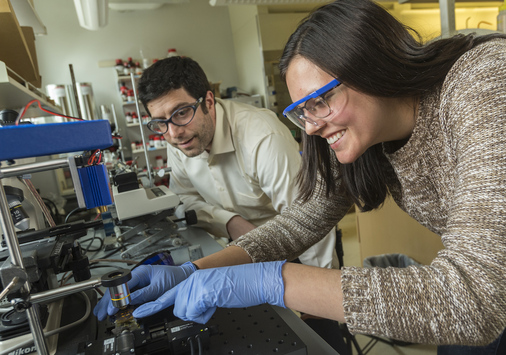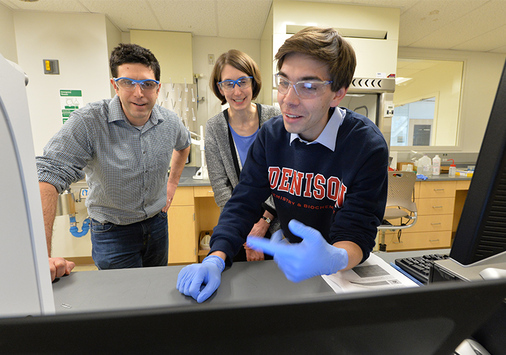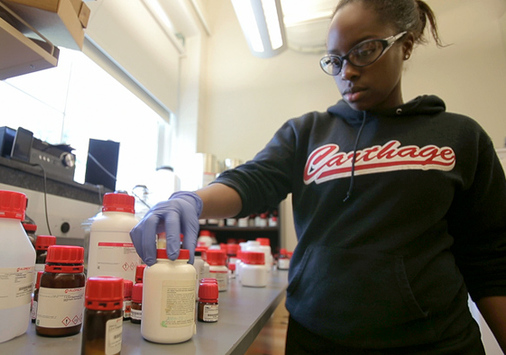Degree Requirements
Requirements for Chemistry & Biochemistry Majors
The department offers three options for degrees in Chemistry & Biochemistry: Bachelor of Science (B.S.) programs in Chemistry and in Biochemistry that provide a rigorous course of study in preparation for professional careers, graduate work in chemistry/biochemistry or related fields, or professional schools (medical, dental, pharmacology, veterinary); and a Bachelor of Arts (B.A.) program in Chemistry for students intending to pursue fields such as dentistry, medicine, secondary school teaching or other areas requiring a strong chemistry background. Earning a B.A. degree does not preclude a professional scientific career, although an additional year of undergraduate study may be required for admission to some graduate programs. The department also offers a minor in Chemistry.
Our program requires courses at the introductory (100), intermediate (200 and 300), and advanced (400) levels. We expect that majors will complete the required 300-level courses by the end of their junior year. The Department of Chemistry and Biochemistry recommends strongly that students earn a C or better in each of the core courses, CHEM 131 - Atoms and Molecules: Structure and Dynamics, CHEM 132 - Organic Structure and Reactivity, CHEM 251 - Intermediate Organic Chemistry and CHEM 258 - Intermediate Biochemistry, before proceeding to 300-level courses. 400-level courses, to be counted toward the major, need to be taken after the prerequisites. Any request to waive this requirement must come prior to taking the course. We strongly encourage all majors to have an advisor in the department.
Students pursuing any of the three majors are required to complete the following eight common courses plus the additional courses listed for each program:
| Code | Title |
|---|---|
| Two introductory courses in the principles of chemistry: | |
CHEM 131 | Atoms and Molecules: Structure and Dynamics |
CHEM 132 | Organic Structure and Reactivity |
| Three required intermediate courses: | |
CHEM 251 | Intermediate Organic Chemistry |
CHEM 258 | Intermediate Biochemistry |
CHEM 343 | Intermediate Physical Chemistry |
| The following three additional science division courses: | |
BIOL 210 | Molecular Biology and Unicellular Life |
MATH 135 | Single Variable Calculus 1 |
PHYS 121 | General Physics I |
All Chemistry and Biochemistry majors must also satisfactorily complete two zero-credit courses used for program assessment CHEM 300 - Chemistry & Biochemistry Assessment I and CHEM 400 - Chemistry & Biochemistry Assessment II.
Note1 Students who based on high school coursework and placement scores receive a zero-credit waiver for MATH 135 are required to take MATH 145 (or equivalent) to satisfy this requirement.
BA in Chemistry
A student may graduate with a B.A. degree in Chemistry on fulfillment of G.E. requirements and the successful completion of the following 11 courses:
- The eight common courses listed above
- One additional four-credit 300-level CHEM course
- One additional four-credit 400-level CHEM course1
- One additional four-credit 300 or 400 level CHEM course1
Note1 CHEM 451 or 452 will not satisfy this requirement
BS in Chemistry
A student may graduate with a B.S. degree in Chemistry on fulfillment of G.E. requirements and the successful completion of the following 16 courses:
| Code | Title |
|---|---|
| The eight common courses listed above | |
| CHEM 317 | Intermediate Inorganic Chemistry |
| CHEM 331 | Intermediate Analytical Chemistry |
| One additional four-credit 300 or 400-level CHEM course | |
| Three additional four-credit 400-level CHEM courses | |
| PHYS 122 | General Physics II |
| One additional calculus-based MATH course (Math 145, 213 or higher) or CS 111. | |
| Example two-course sequence in MATH / CS. One of the following: MATH 135 / MATH 145 MATH 135 / CS 111 (If zero-credit waiver for MATH 135 received) MATH 145 / MATH 213 MATH 145 / CS 111 | |
Note: In order to successfully complete the required courses for a B.S. in Chemistry, students are strongly encouraged to start CHEM 131 in the first semester of their first year.
BS in Biochemistry
A student may graduate with a B.S. degree in Biochemistry on fulfillment of G.E. requirements and the successful completion of the following 16 courses:
| Code | Title |
|---|---|
| The eight common courses listed above | |
| CHEM 331 | Intermediate Analytical Chemistry |
| One Advanced Biochemistry Course (CHEM 44X) | |
| One four-credit 300-level or 400-level CHEM course | |
| One four-credit 300 level BIOL course | |
| One additional 300-level BIOL or 400-level CHEM course | |
| BIOL 220 | Multicellular Life |
| PHYS 122 | General Physics II |
| One additional MATH course (Math 120, Math 145 or higher) or CS 111 | |
| Example two-course sequence in MATH / CS. One of the following: MATH 135 / MATH 120 MATH 135 / MATH 145 MATH 135 / CS 111 (If zero-credit waiver for MATH 135 received) MATH 145 / Math 120 MATH 145 / Math 213 MATH 145 / CS 111 | |
- 1
(All advanced courses in Biology have prerequisite courses that a student majoring in Biochemistry may not have completed. Students must either obtain the appropriate prerequisite courses or obtain the permission of the instructor before registering for these advanced Biology courses.)
Note: In order to successfully complete the required courses for a B.S. in Biochemistry, students are strongly encouraged to start CHEM 131 in the first semester of their first year.
The Minor in Chemistry
A student may graduate with a minor in chemistry on successful completion of the following six courses, taken at Denison:
| Code | Title |
|---|---|
| Two introductory courses in the principles of chemistry: | |
CHEM 131 | Atoms and Molecules: Structure and Dynamics |
CHEM 132 | Organic Structure and Reactivity |
| Two required intermediate courses | |
CHEM 251 | Intermediate Organic Chemistry |
CHEM 258 | Intermediate Biochemistry |
| Two additional 300 or 400-level CHEM courses | |
Research and ACS Certification
For students pursuing the B.S. degree in either Chemistry or Biochemistry, two semesters of Senior Research (or a summer research experience at Denison followed by one semester of Senior Research in the same laboratory) may be counted as one of the 400-level electives.
The B.S. Chemistry major who takes CHEM 325 - Polymer Chemistry as part of the degree requirements will earn a degree certified to the American Chemical Society. The B.S. Biochemistry major who takes CHEM 317 - Intermediate Inorganic Chemistry and CHEM 325 - Polymer Chemistry as part of the degree requirements will earn a degree certified to the American Chemical Society.
Majors are encouraged to participate in the various on-going research projects in the department. Additional research opportunities are available in the department during the summer and as part of the Oak Ridge Science Semester.
Additional Points of Interest
Students interested in teaching should consult with faculty in the Department of Education. Faculty and staff in the Department of Education assist students in creating individually designed plans for obtaining licensure through a range of programs after graduation. Students interested in pursuing a B.A. degree in Chemistry before pursuing a teaching career are strongly encouraged to take all three 300-level Chemistry course options (as described below).
The Chemistry courses listed above must be taken at Denison with the following exception: the Department of Chemistry and Biochemistry recognizes the valuable contribution that off-campus study can provide to a broad liberal arts education, so one course in the major at the 300-level or higher may be taken at another institution, providing that prior approval is received from the department. Students considering study off-campus are encouraged to discuss these plans with their academic advisor early in their Denison careers. The department understands that transfer students, students who adopt a chemistry or biochemistry major after the first year, and students who study off-campus may have unique needs; we encourage them to contact us so that we can work together to help them achieve their academic objectives.
Approved eye protection is required in all laboratory courses.














